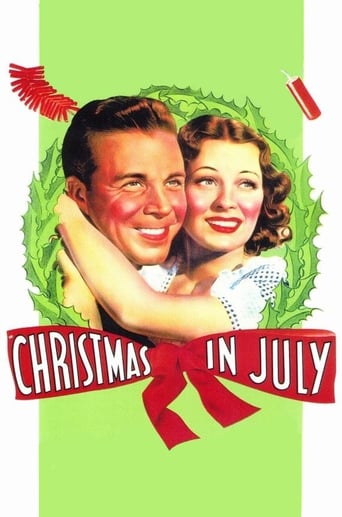earthhistory
I saw this movie for the first time yesterday and my first impression was of watching a time capsule and then realizing this was a clever, well crafted story, one infused with optimism and not a little moral instruction. The movie is prescient--it lays out a vision of the American Dream suppressed by events that lead up to its time (1940), a goal of sorts eventually unleashed only after WWII.The story is fun and I have to agree with the many favorable reviews here. I just want to mention there is a delightful, unexpected image that closes the movie--and you will have to see it through to find out what it is.
MartinHafer
This is probably my favorite Presto Sturgess film--and I am not sure wonder why it's one of his least famous films. This is because although the story is quite simple, it's presented absolutely perfectly. The dialog, the characters and everything about the production is top-notch. In fact, it's so good I give it a 10--something I actually do pretty rarely. But it has got to be one of the best comedies of its time--in the same league as great comedies such as "Bringing Up Baby", "His Girl Friday" and "Arsenic and Old Lace" (all, incidentally, which starred Cary Grant).The film stars Dick Powell and Ellen Drew. I have always liked Powell in films where he didn't sing--he had a nice presence about him and was underrated as an actor. As for Powell, he, too, hated the singing in all his earlier films and I am sure he liked having a break in the usual routine. However, if you've seen many of writer/director Sturgess' films, you'll know that the real stars of his movies are the wonderful supporting characters. Raymond Walburn is simply terrific but Franklin Pangborn, William Demerest (who seems to be in almost EVERY Sturgess film) and Ernest Truex are just wonderful and add so much color to the movie.Powell plays a guy who is always entering jingle contests (something rather popular back in the good 'ol days) but keeps failing. He is especially excited about a coffee company that is giving away a $25,000 first prize--and that's all he thinks about or talks of to his fiancé or at work. To play a joke on him (a very, very unfunny one), one of his co-workers decide to send him a phony telegram saying he's won this contest. As soon as this occurs, an unexpected chain of events takes place and the joke goes spiraling out of control. I'd say more, but I don't want to ruin the film. Just see the movie--it will give you quite a few laugh out loud moments and is clever and supremely well-constructed. A must-see.
Michael_Elliott
Christmas in July (1940) *** 1/2 (out of 4) Preston Sturges comedy about a poor boy (Dick Powell) with big dreams who goes on a shopping spree after he thinks he's won $25,000 in a contest. This was actually my first film from the director and I got a tad bit nervous at first because the comedy in the opening ten minutes really didn't work for me. I wasn't sure how the rest of the film was going to work with me but it was a homerun after the scene in the office where Powell thinks he's won the money. The film is certainly pretty shallow in its delivery but that works just fine since the one word that came to my mind while watching the film was sweet. The film has a sweet little idea with sweet little messages and in the end it delivers on pretty much all levels. Powell is very good in the role but it's the supporting cast that steals every scene.
matusekpres
Could this be one of Preston Sturges's most profound comedies? In addition to being one of the funniest and most underappreciated. In "Sullivan's Travels," Preston Sturges has theJoel McCrea character speak admiringly of fellow director FrankCapra. In "Christmas in July" possibly Sturges was trying to teachCapra how to handle sentiment without falling into sentimentality --the scene where Dick Powell is handing out presents to hisneighbors, and he gives a doll to a crippled girl in a wheelchair --a remarkably tender moment in the midst of a hectic scene -- donewith just the right touch, One of my favorite lines occurs whenbug-eyed Raymond Walburn sarcastically tells contest-winnerPowell, "I can't wait to give you my money!" Sturges also showsthat you can have plot complications without resorting to villains --no Capraesque class warfare here -- rich and poor are equallylovable -- even gruff William Demarest.




